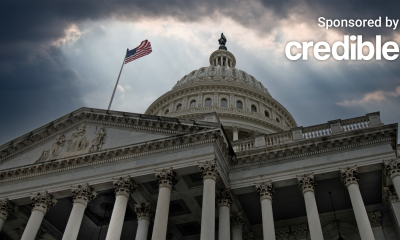Side Hustles
The Government Is Forcing Business Owners to Share Personal Data or Get Fined $10,000 — So Why Don’t More People Know About It?

Entrepreneur
I frequently speak to groups of business owners in industries ranging from metalworking to the distribution of auto parts and supplies. These are smart people. Yet, many of them are not aware of a reporting deadline fast approaching that could cost them as much as $10,000 if they don’t comply. Are you?
The reporting requirement is part of the Corporate Transparency Act (CTA), a law that was passed in 2021 as part of the National Defense Authorization Act. The CTA requires most business entities in this country to report the full legal name, birthdate, address, passport and/or driver’s license information of their “beneficial owners” (which is defined either as someone who has “substantial control” over the reporting company either by ownership or influence over its management decisions) to the federal government. Every beneficial owner of every entity must be reported to the by December 31. What is the cost of not doing so? Up to $10,000 in fines for each entity.
Have I got your attention? I hope so. And you probably have the following questions — or misconceptions:
“A $10,000 fine? Why have I never heard of this rule before?”
That’s understandable. The federal government has done a poor job of spreading awareness. Unfortunately, many financial professionals, business experts and consultants have not pressed their clients hard enough to comply. And the media? They’re more interested in reporting on the election and pop culture rather than a boring and unsexy business regulation. But that’s not an excuse. This is not just another rule. It’s law. And the fine is real.
Related: Not Filing This New Mandatory Report Could Cost Your Business $500 Per Day
“Is this just more red tape?”
I’m sure — as many business owners I know — you’ve been inundated with regulations recently. I get it. Over the past few years, businesses have had to comply with new rules and regulations about how they classify workers, pay overtime, address discrimination and ensure safety in their workplaces from government agencies ranging from the Department of Labor to OSHA. These are regulations that can be (and are) contested in court and can even be overturned or reversed by future administrations.
However, the CTA is not just another regulation or executive order. It’s legislation. Yes, it can be contested in courts (see below), but it cannot be overturned simply by a new president. It has more teeth and needs to be taken seriously.
“This will not last very long — right?”
Some think the law will be overturned in the courts or by Congress. But that’s not likely anytime soon. Opposition by legislators in Congress has been weak and ineffective so far. Business groups like the National Small Business Association (NSBA) and the Small Business Association of Michigan have filed lawsuits challenging the law’s constitutionality but these lawsuits will take many months before having their day in court. A federal judge in Alabama overturned the law earlier this year, but because the case was not a class action, the ruling only affected the members of a single association — about 65,000 small businesses of the 33 million potentially impacted. The Treasury Department has vowed to carry on with the filing requirement for everyone else and is appealing the judgment.
“I doubt my business will be impacted because it’s too small.”
No, your business isn’t too small. In fact, it’s the opposite case. The smaller your small business, the greater the chance you’re impacted. The CTA’s intention is to uncover any owners of U.S. companies that could be a security risk. There are 23 types of businesses — from accounting and law firms, banks and credit unions to most tax-exempt entities — that are exempted. The government isn’t going after larger companies, which is why firms that have more than 20 employees or more than $5 million in revenues are exempt. Why? Because the probability of these companies having shareholders that pose a security threat is less likely because there is regulatory and professional oversight in place that monitors their ownership.
This is why it’s the smallest of entities — the little partnerships, limited liability companies and pass-throughs are considered the most likely to have potential bad actors as owners. These entities are easy to set up. There are few restrictions. These are the “shell companies” or “fronts” or independents and freelancers that can then be used as decoys for illegal businesses or criminal organizations. The government wants to know about them. Keep in mind that the CTA is part of the National Defense Authorization Act.
Related: Data Privacy Matters to Your Customers — Show Them It’s a Priority For You, Too. Here’s How.
“I don’t trust the government with my data.”
Given the number of incursions, breaches and other security flaws exposing our most personal information by hackers, it’s reasonable to be wary of how protected your data will be. And given that you’re required to submit data from your passport or driver’s license, it’s reasonable to be concerned about just how it will be used. I have the same concerns. But unfortunately, there’s little recourse here. The government requires that we submit this data, and unless something happens that stops this law from being implemented, or new legislation overturns it — that’s what we have to do. You can take cynical comfort in knowing that much of this data is probably already known by the government (or available somewhere on the dark web), but of course, that’s just a fact of life in the 21st century.
“My accountant is going to charge me.”
If you ask for the help of a financial or legal professional, then yes, they will likely charge you. But know that reporting your beneficial owners is actually not so hard. You can get a financial or legal professional to help, but it’s really not needed. I went online and filled out the information for my company. It took me less than 15 minutes. Be aware that updates need to be made when there’s a change in ownership, but that’s not likely for my company in the foreseeable future.
Compared to all the other headaches we have as business owners, the reporting process required by the CTA is pretty low on the list. I know it’s annoying. But hey, like I tell all the groups of business owners I talk to so frequently, it’s the government, right?
Read the full article here

-

 Side Hustles6 days ago
Side Hustles6 days agoWhy the Best CEOs Think Like Anthropologists
-

 Side Hustles4 days ago
Side Hustles4 days agoThis User-Friendly H&R Block Software Package is Only $40, While Supplies Last
-

 Investing4 days ago
Investing4 days agoTikTok faces US ban deadline as users brace for fallout By Reuters
-

 Passive Income3 days ago
Passive Income3 days agoTrain for a New Tech Career in 2025 With This $25 Course Bundle
-

 Personal Finance5 days ago
Personal Finance5 days agoDecember inflation clouds Fed's outlook on interest rate cuts
-

 Personal Finance6 days ago
Personal Finance6 days agoCalifornia's homeowners insurance industry faces rough road ahead as wildfires continue
-

 Investing6 days ago
Investing6 days agoWhy Not Owning Bitcoin is Making You Poor
-

 Make Money6 days ago
Make Money6 days agoDon’t Settle: 5 Game-Changing Moves to Maximize Your Financial Advisor’s Impact


















